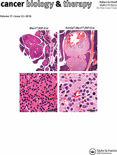
CANCER BIOLOGY & THERAPY
Scope & Guideline
Transforming cancer treatment through cutting-edge research.
Introduction
Aims and Scopes
- Cancer Mechanisms and Pathways:
The journal explores underlying biological mechanisms of cancer, including genetic, epigenetic, and metabolic pathways that drive tumorigenesis and cancer progression. - Therapeutic Strategies and Innovations:
It publishes research on novel therapeutic approaches, including targeted therapies, immunotherapies, and combination treatments aimed at improving patient outcomes. - Precision Medicine and Biomarkers:
A significant focus is on precision medicine, including the identification and validation of biomarkers that can predict treatment responses and guide personalized therapy. - Tumor Microenvironment and Immunology:
Research on the tumor microenvironment, including interactions between cancer cells and immune cells, is emphasized, highlighting the role of immune evasion and therapy resistance. - Clinical Applications and Trials:
The journal also includes studies from clinical trials and real-world evidence that inform clinical practices and therapeutic decision-making in oncology.
Trending and Emerging
- Immunotherapy and Resistance Mechanisms:
Research on cancer immunotherapy, including mechanisms of resistance and strategies to enhance immune responses, has gained significant traction, reflecting the growing importance of immuno-oncology. - Molecular Targeting and Precision Medicine:
There is an increasing focus on precision medicine, with studies aimed at understanding molecular targets and the development of therapies tailored to specific genetic profiles of tumors. - Role of the Tumor Microbiome:
Emerging studies are investigating the influence of the tumor microbiome on cancer progression and treatment response, highlighting its potential role in therapeutic strategies. - Exosomes and Extracellular Vesicles:
Research into the role of exosomes and extracellular vesicles in cancer communication, metastasis, and therapy resistance has become a prominent theme, indicating a shift in understanding tumor biology. - Epigenetic Modifications:
The exploration of epigenetic changes in cancer and their implications for therapy is on the rise, suggesting a renewed interest in how these modifications affect tumor behavior and treatment responses.
Declining or Waning
- Traditional Chemotherapy Approaches:
There has been a noticeable decrease in studies solely focusing on traditional chemotherapy regimens, as the field shifts towards more targeted and personalized treatment strategies. - Basic Cell Line Studies:
Research utilizing standard cancer cell lines without additional context or innovative methodologies appears to be declining, with a trend towards more complex models that better represent tumor biology. - Single Modality Treatments:
Papers centered around single-agent therapies are becoming less common, reflecting a movement towards combination therapies and multi-modal approaches for more effective cancer treatment.
Similar Journals

Molecular Cancer
Unlocking the secrets of cancer biology and treatment.Molecular Cancer, published by BMC, stands as a premier open access journal dedicated to advancing our understanding of cancer biology, treatment, and prevention since its inception in 2002. With an impressive Q1 ranking in the domains of Cancer Research, Molecular Medicine, and Oncology, this journal occupies a significant position in the academic landscape, emphasizing high-quality research that influences clinical practices and future studies. The journal is indexed in leading databases with exceptional Scopus ranks, reflecting its rigorous peer-review process and impactful contributions to the field, where it ranks in the top 2-3 positions across various relevant categories. Based in the United Kingdom, Molecular Cancer offers researchers worldwide a valuable platform for disseminating innovative findings that drive the biomedical community forward. The journal's open access model ensures that groundbreaking research is freely accessible, fostering collaboration and knowledge sharing among professionals, students, and academics alike. Explore cutting-edge developments in cancer research through Molecular Cancer and join a community committed to improving patient outcomes and advancing scientific discovery.

Molecular & Cellular Oncology
Connecting researchers to the forefront of oncology.Molecular & Cellular Oncology, published by Taylor & Francis Inc, is a vital academic journal dedicated to the exploration of cancer biology through the lens of molecular and cellular mechanisms. Since its inception in 2014, the journal has played a crucial role in disseminating innovative research findings that address the fundamental aspects of cancer research and molecular medicine. With its current ranking in Scopus placing it in the Q3 quartile for both Cancer Research and Molecular Medicine, the journal provides a platform for groundbreaking studies that push the boundaries of our understanding of oncogenesis and therapeutic interventions. Although the journal operates under a subscription model, its dedication to high-quality peer-reviewed research makes it an essential resource for researchers, professionals, and students aiming to contribute to or stay updated in the rapidly evolving field of oncology. As we approach the culmination of its converged years in 2024, Molecular & Cellular Oncology aims to continue fostering collaborations and insights that advance cancer research on a global scale.
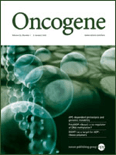
ONCOGENE
Illuminating the Pathways of Molecular OncologyONCOGENE is a premier peer-reviewed journal published by SpringerNature, serving as a crucial platform for innovative research within the fields of Cancer Research, Genetics, and Molecular Biology. With an impressive Impact Factor and a distinguished Q1 ranking across major categories, ONCOGENE publishes cutting-edge studies aimed at unraveling the complexities of cancer biology and genetic mechanisms. The journal has been a vital resource for the academic community since its inception in 1987, and it continues to foster rigorous scientific discussions and collaborations. Researchers, professionals, and students can access a wealth of critical insights and advances in cancer genomics and therapeutic approaches, cementing ONCOGENE’s role as a leading voice in the landscape of biomedical research. For comprehensive academic research, ONCOGENE remains an indispensable source of knowledge with contributions that significantly impact the evolution of cancer research and treatment strategies.

Cancer Research Communications
Pioneering breakthroughs in oncology communication.Cancer Research Communications is an esteemed journal published by the American Association for Cancer Research, a leading organization in the field of oncology. This journal aims to advance knowledge in cancer research through the dissemination of high-quality, peer-reviewed articles that cover a wide range of topics related to cancer biology, treatment modalities, and prevention strategies. As an open-access journal, Cancer Research Communications ensures that vital research findings are accessible to a global audience, promoting collaboration and innovation within the scientific community. The journal serves as a crucial platform for researchers, professionals, and students to share their insights and foster the exchange of effective cancer therapies and methodologies. With a commitment to excellence, it plays a significant role in shaping the future of cancer research and therapeutic development.

Annual Review of Cancer Biology
Charting New Directions in Cancer StudiesAnnual Review of Cancer Biology is a pivotal journal published by Annual Reviews, specializing in the rapidly evolving field of cancer research. With an impact factor positioned in the distinguished Q1 quartile of Cancer Research, Cell Biology, and Oncology categories, this journal ensures that it showcases the highest quality of scholarly contributions. Indexed in Scopus, it ranks among the top in its fields, reflecting its strong influence and relevance, with remarkable percentiles indicating its esteemed position within the research community. Although not an open-access journal, it provides a comprehensive platform for advancing the frontiers of cancer biology through rigorously curated reviews, highlighting key developments, breakthroughs, and future directions that inform both academia and clinical applications. As a valuable resource for researchers, professionals, and students, the Annual Review of Cancer Biology serves as an essential guide for understanding and addressing the complexities of cancer biology today.
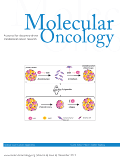
Molecular Oncology
Transforming Cancer Insights into Global Knowledge.Molecular Oncology, published by WILEY, is a premier open-access journal that has been at the forefront of cancer research since its inception in 2007. With an impressive impact factor reflective of its outstanding contribution to the field, it holds a prestigious position in the Q1 category across multiple disciplines, including Cancer Research, Genetics, and Molecular Medicine. This journal is essential for researchers and professionals seeking to publish high-quality findings in a rapidly evolving area of study, underscored by its significant Scopus rankings that place it within the top percentiles of Oncology and Molecular Biology. As an open-access journal since 2017, it ensures that vital research is readily available to a global audience, thereby facilitating collaboration and knowledge dissemination among academic and clinical communities. With its commitment to innovative and impactful research, Molecular Oncology continues to be a critical resource for advancing our understanding of cancer biology and treatment.
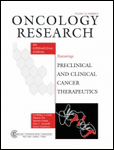
ONCOLOGY RESEARCH
Pioneering Insights in Oncology and MedicineONCOLOGY RESEARCH, published by TECH SCIENCE PRESS, is a vital academic journal dedicated to the rapidly evolving field of oncology. With its ISSN 0965-0407 and E-ISSN 1555-3906, the journal serves as a key resource for researchers, clinicians, and academicians committed to advancing cancer research and treatment strategies. Operating without an Open Access model, ONCOLOGY RESEARCH provides high-quality, peer-reviewed articles that cover diverse topics within cancer research, medicine, and oncology, with its 2023 Scopus ranking placing it in the Q3 quartile. The journal's commitment to facilitating rigorous scientific discourse is evident in its historical breadth, with a publishing history dating back to 1992. ONCOLOGY RESEARCH is not only significant for the academic community but also plays a critical role in fostering new insights and approaches in the fight against cancer, making it a must-read for those involved in this critical area of study.
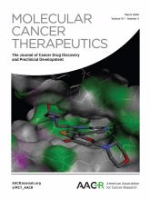
MOLECULAR CANCER THERAPEUTICS
Advancing cancer therapy through molecular insights.MOLECULAR CANCER THERAPEUTICS, published by the American Association for Cancer Research, is a premier journal dedicated to advancing the field of cancer research and therapy since 2001. With a notable impact factor reflecting its high-quality content, this journal stands out in the Q1 category for both Cancer Research and Oncology as of 2023. Researchers, clinicians, and students interested in innovative treatment strategies and molecular mechanisms can find valuable insights within its pages, bolstered by a rigorous peer-review process and a global perspective on cancer therapeutic developments. Although the journal operates under a subscription model, it provides comprehensive access to cutting-edge studies and reviews that drive forward the understanding of cancer biology and treatment modalities. The journal's impressive Scopus rankings further validate its influence within both oncology and the broader cancer research community, making it an indispensable resource for anyone committed to combating cancer through science.

CANCER IMMUNOLOGY IMMUNOTHERAPY
Fostering Breakthroughs in Cancer Treatment StrategiesCancer Immunology Immunotherapy, published by Springer, stands as a premier journal in the fields of cancer research and immunology, holding a prestigious Q1 ranking across multiple categories, including Oncology and Medicine as of 2023. With an ISSN of 0340-7004 and an E-ISSN of 1432-0851, this journal has been a pivotal platform for groundbreaking research since its inception in 1976, continuing to provide insight into the complex interactions between the immune system and cancer. The journal's scope encompasses a wide array of topics, including novel therapeutic strategies, immunological mechanisms, and translational science aimed at advancing treatment outcomes for cancer patients. Renowned for its rigorous peer-review process and high impact factor, it attracts contributions from leading experts and researchers around the globe, positioning itself among the top-tier publications with Scopus rankings that reflect its vital role in advancing the field. Access options are generally subscription-based, ensuring a comprehensive resource for professionals and academics seeking to deepen their understanding and make meaningful contributions to cancer immunotherapy.

NATURE REVIEWS CANCER
Transforming Insights into Innovations in OncologyNATURE REVIEWS CANCER, a premier journal published by NATURE PORTFOLIO, stands as a cornerstone in the field of oncology, focusing on delivering high-quality, comprehensive reviews that shape our understanding of cancer biology, prevention, and treatment. With an impressive impact in the academic community, it ranks Q1 in both Cancer Research and Oncology categories as of 2023, further denoted by a remarkable Scopus ranking as the top journal in Cancer Research and second in Oncology. This ensures that published articles not only set the standard for scientific excellence but also drive significant advancements in cancer research methodologies and practices. The journal's targeted audience, including researchers, practitioners, and students, will greatly benefit from its insightful analyses and interdisciplinary approach. While it operates under a traditional subscription model, the rich content and vast expertise presented in its articles foster a global dialogue on cancer-related issues, making it an essential resource for anyone dedicated to the advancement of cancer science.